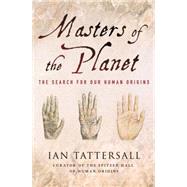
“An efficient survey of 7 million years of evolutionary development and two centuries of evolutionary thought . . . In deft combinations of authority and caution, expertise and wit, Tattersall invites the lay reader to the party. Throughout, he remains grounded in the salient details culled from archaeology, anatomy, genetics, primatology, nutrition and social science.”--The Cleveland Plain Dealer
"A superb overview of how our species developed (a long process) and how we grew smart enough to dominate the planet . . . Keeping a critical eye on the evidence and a skeptical one on theories, Tattersall confirms his status among world anthropologists by delivering a superior popular explanation of human origins." --Kirkus Reviews starred review
“A concise history of how humans became humans . . . Tattersall moves through the complex fossil records effortlessly and with a welcome sense of wonder. He also consistently conveys a deep knowledge of his subject . . . Tattersall’s combination of erudition and a conversational style make this is an excellent primer on human evolution.” –Publishers Weekly
“This is a book I will be recommending to anyone who wants a good overview of evolution. This book puts the new discoveries in their proper sequence and perspective. It is an excellent work.” –Jean Auel, author of The Clan of the Cave Bear, and the rest of Earth’s Children books
"We all think we know the story: first we evolved to walk upright, then use tools, then agriculture, language, and us - - an inexorable linear progression from ape to human. But Ian Tattersall introduces us to several different human-like precursors, all alive at the same time, as recently as 50,000 years ago - just barely before the period we humans chauvinistically refer to as 'history'. So it's no longer straightforward: beasts like us emerged several times within the past hundred thousand years, some of them distinct species. Some were the first to think like we do: in symbols and abstractions; those were our forebears. But while they were alive, these multiple different humanoids may have known about each other; interacted; fought; lived together or apart; possibly even bred. It turns out that our lineage is anything but linear; Tattersall demolishes the versions we were once taught, and lays out the remarkable new history of our diverse origins for the first time."--Richard Granger, author of Big Brain
"Are you ready for a 3.5 billion year stroll down the path of life's origins to the present. Ian Tattersall takes you by the hand and covers the highlights like few are capable of doing. The continuities and discontinuities reveal insights on why we humans are the masters of the planet. A must read."--Mike Gazzaniga, author of Human: The Science Behind What Makes Your Brain Unique
“This [book] is excellent… Among other things, and very importantly, it is a very good read.”–Colin Tudge, author of The Link: Uncovering Our Earliest Ancestor
"For almost 40 years, Ian Tattersall has been one of our leaders in the field of human evolution. Masters of the Planet is a stunning culmination of a career in science: a brilliant and engaging account that illuminates and inspires. Read Tattersall and you will not see yourself, let alone our entire species, in the same way again."--Neil Shubin, author of Your Inner Fish
"This is a book full of wisdom: the distillation of a lifetime’s experience combined with finely honed critical faculties. Tattersall is a captivating and surefooted guide through the ranks of hominids, over several million years, in search of the origins of our uniquely symbolic mind. He ranges widely across evidence from DNA sequences and molecular forensics to skeletal morphology and ancient artifacts, never shirking the telling detail, never lacking a finely judged opinion, yet always making the science beautifully clear. The best guide to human origins that I have read."--Nick Lane, author of Life Ascending and Oxygen
The New copy of this book will include any supplemental materials advertised. Please check the title of the book to determine if it should include any access cards, study guides, lab manuals, CDs, etc.
The Used, Rental and eBook copies of this book are not guaranteed to include any supplemental materials. Typically, only the book itself is included. This is true even if the title states it includes any access cards, study guides, lab manuals, CDs, etc.